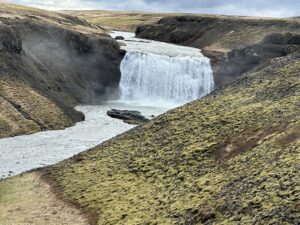
Kjosarhreppur, Inceland. Photo by the author
In this week’s Torah portion, Hukat, we begin by learning about the red heifer, whose ashes would be mixed with water and sprinkled on a person who had been made ritually impure by reason of a corpse, in order to purify them. It’s good information, because as soon as we get through those instructions, Miriam dies.
According to commentators like Rashi, the Israelites are in their 40th year of wandering in the wilderness, and all who were destined to die before reaching the promised land had already succumbed, either to natural causes or various plagues and occurrences.
All the text tells us is “Miriam died there and was buried there (in Kadesh).” Immediately, the text moves on, “The water for the community, and they assembled against Moses and Aaron.” Midrash looks at these two verses and supposes that as long as Miriam was alive, a well of water followed, and the people were able to drink freely. When she died, it dried up. Bamidbar Rabbah states, “The well was due to the merit of Miriam, who recited song at the sea, as it is stated: “Miriam called to them: Sing to the Lord” (Exodus 15:21).”
Not surprisingly, the people began to complain and rise up against Moses and Aaron, convinced that they will now died in the wilderness as their parents did. Following a few more verses, God tells Moses to hold up his staff and order the rock to give water, and instead, Moses struck the rock, which is one of the reasons stated for why he wouldn’t enter the Promised Land.
We know how vital water is to life, to our planet, to our universe, but this isn’t about environmental responsibility; it’s about our own personal wells and the waters that flow from them. These waters are nurturing, creative, caring and compassionate. They flow through our bodies and brains and out into the world through our paid work, our hobbies and interests, our offspring and families. It’s what we put out into the world, and how we might help to make the world a better place.
Miriam was the nurturer; the one who waited for Moses in the river and orchestrated his return to his family until he was weaned. She led the women in dancing after safely crossing the Sea of Reeds, and I imagine she fulfilled many roles as a woman, a prophet and a leader. She gave from her well, and I hope she was nourished by the wells of those around her. And when her well had completely run dry, she died, leaving a huge void in the community.
As we age, our bodies and brains change. Our wells may not produce as much as they used to, but they still providing sustenance and more, as long as the source(s) of the well are still there.
As long as we live, may the living waters–in whatever form they take–continue to flow to us and through us.









0 Comments